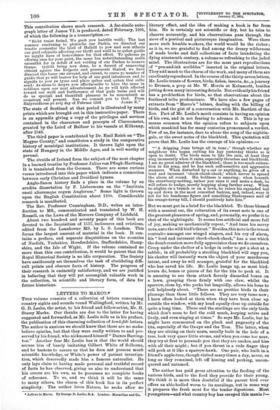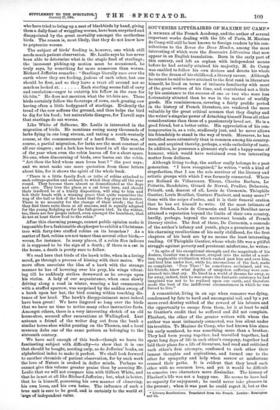LETTERS TO MARCO.*
Tam volume consists of a collection of letters concerning country sights and sounds round Wallingford, written by Mr. G. D. Leslie, the artist, to his friend and fellow-artist, Mr. H. Stacey Marks. Our thanks are due to the latter for having suggested and forwarded, as Mr. Leslie tells us in his preface, the publication of this charming collection of bond-fide letters. The author is anxious we should know that these are no make- believe epistles, but that they were really written to and pre- served by his friend, who nicknamed himself " Daines Barring- ton." Another fear Mr. Leslie has is that the world should accuse him of basely imitating Gilbert White of Selborne, and he hastens to assure us that he does not possess much scientific knowledge, or White's power of patient investiga- tion, which deservedly made him a famous naturalist. He only lays claim to having made personal and truthful record of facts he has observed, giving us also to understand that his errors are his own, as he possesses no complete books of reference. To us, and we think it will be the same to many others, the charm of this book lies in its perfect simplicity. The author loves Nature, he seeks after no • Lonna to Marco. By George D. Leslie, H. L. London: Macmillan and 0o. literary effect, and the idea of making a book is far from him. He is certainly not scientific or dry, but he tries to observe accurately, and his observations pass through the sieve of a poetical and picturesque imagination. Were there more such humble workers, the world would be the richer; as it is, we are grateful to find among the dreary wilderness of made books and dull collections of facts inundating the dying nineteenth century, a volume so refreshing to the jaded mind. The, illustrations are for the most part reproductions of " pen-and-ink scribbles " inserted in the original letters. They add much to the charm of the work, and many of them are excellentlyreproduced. In the course of the thirty-seven letters, Mr. Leslie treats of flowers, birds, fishes, insects, &c., a journey to Bremen, a peep at Mr. W. Morris at Kelmscott, besides jotting down many interesting details. But evidently his friend has a predilection for birds, so that observations about the feathered tribe predominate. We have also a few pages of extracts from " Marco's " letters, dealing with the billing of birds, and the gist of a conversation with Mr. Bartlett of the Zoo. Part of Mr. Leslie's merit consists in having an opinion of his own, and in not fearing to advance it. This is by no means common when the opinion refers to subjects upon which mankind has for many centuries pronounced a verdict. Few of us, for instance, dare to abuse the song of the nightin- gale, or the sweet notes of the blackbird. This quotation will prove that Mr. Leslie has the courage of his opinions :— " A dripping June brings all in tune ; ' though whether my neighbour who began cutting his hay yesterday thinks so is open to doubt. The birds seem to like the rain, at least they sing incessantly when it rains, especially thrushes and blackbirds. I am no great admirer of the blackbird; there is too much reitera- tion in his song, and he has such self-assertive and aggressive manners. When disturbed by a cat or anything, he gives off a loud and incessant `cheek-cheek-cheek,' which serves to spread the alarm all round. His boldness is amazing; when beneath the strawberry-netting, unless you raise it and make a dash, he will refuse to budge, merely hopping along farther away. When he alights on a branch or on a lawn, he raises his expanded tail up and down in the most conceited fashion, and, indeed, were it not for his handsome figure and something Shakespeare said of his orange-tawny bill, I should positively hate him."
But we must put in a brief for the blackbird. To those blessed with a musical ear, the reiteration of its sweet note is one of
the greatest pleasures of spring, and, personally, we prefer it to that of the nightingale. It seems less artificial and more full
of joy, making us mechanically repeat, "And tune his merry note, unto the wild bird's throat." Besides, this note is the truest contralto amongst our winged singers, and his cry of alarm, his " loud and incessant cheek-cheek-cheek," has a use which the dumb creation more fully appreciates than we do ourselves. Creep under the shelter of a hedge in order to get a shot at a rabbit; in all probability a strolling blackbird will espy you, his chatter will instantly warn the object of your murderous intent, and away he will scamper, grateful for the blackbird who has saved his life. Mr. Leslie hangs up, as most bird- lovers do, bones or pieces of fat for the tits to peck at. It is amusing to see them attack fiercely discarded bones on a lawn, grasping them firmly with one claw, whilst the sparrow, close by, who pecks but languidly, allows his bone to roll helplessly about. " There are no prettier birds in their plumage than these little fellows. They are very tame now; I have often looked at them when they have been close up outside the window, with my head equally close up outside for quite a long time. These and the starlings are the only birds which don't seem to feel the cold much, keeping active and lively, and even singing at times." So says Mr. Leslie, but he might have commented on the pluck and pugnacity of the tits, especially of the Ox-eye and the Tom. The latter, when they are sitting on their nests, usually built in the hole of a tree, look very queer little atoms, and when you come too near, they try at first to persuade you that they are snakes, and hiss with all their might ; but if you thrust in a rude finger they will peck at it like a sparrow-hawk. One pair, who built in a friend's apple-tree, though visited many times a day, never, as long as they remained, left off hissing and pecking, uncon- quered and untamed.
The author has paid great attention to the feeding of the various birds, and to the food they provide for their young. We think it is more than doubtful if the parent bird ever offers an able-bodied worm to its nurslings, but in some way it prepares the fresh meat for the tender digestions. Most youngsters—and what country boy has escaped this mania P-
who have tried to bring up a nest of blackbirds by hand, giving them a daily feast of wriggling worms, have been surprised and disappointed by the great mortality amongst the motherless birds. The reason is, most likely, that they do not know how to peptonize worms.
The subject of birds' feeding is, however, one which still needs much patient observation. Mr. Leslie says he has never been able to determine what is the staple food of starlings ; the incessant picking-up motion must be occasioned, he truly says, by something far more numerous than worms.
Richard Jefferies remarks : " Starlings literally race over the earth where they are feeding, jealous of each other, lest one should be first, and so they leave a tract all around not so much as looked at Each starling seems full of envy and emulation—eager to outstrip his fellow in the race for tit-bits." He does not mention what the tit-bite are. These birds certainly follow the footsteps of cows, each grazing cow having often a little bodyguard of starlings. Evidently the tread of the cow softens the ground, and thus helps the bird to dig for his food; but naturalists disagree, for Yarrell says that starlings do eat worms.
Like White of Selborne, Mr. Leslie is interested in the migration of birds. He mentions seeing many thousands of larks flying in one long stream, and taking a south-westerly course, at the commencement of a hard frost. This was, of course, a partial migration, for larks are the most constant of all our singers ; and a lark has been heard in all the months of the year when even the robin leaves off for a short space. No one, when discoursing of birds, ever leaves out the robin. " Art thou the bird whom man loves best " the poet says ;
and we must make one more quotation from these letters about him, for it shows the spirit of the whole book.
"There is a little family flock or tribe of robins attached to each cottage-garden and orchard, to which they cling all the year round. They become there almost as domesticated as the dogs and cats. They love the place as a cat loves hers, and should their landlord be of a kindly disposition, will sing to him and bob their heads with a winning grace that quite resembles the wag of the tail or lick of the hand that the dog gives his master. There is no necessity for the change of their abode ; the food they find there suits them at all seasons, and is equally adapted for the young fledgling as for the full-grown bird. In the winter, too, there are few people indeed, even amongst the humblest, that do not at least throw food to the robin."
After this charming passage, cannot public opinion make it impossible for a fashionable shopkeeper to exhibit a Christmas- tree with forty-two stuffed robins on its branches ? As a matter of fact, robins are not tamer than several other birds,— wrens, for instance. In many places, if a robin flies indoors it is supposed to be the sign of a death ; if there is a cat in the house, a death is pretty sure to follow.
We read here that birds of the hawk tribe, when in a loving mood, go through a process of kissing with their mates. We more often associate the idea of a hawk with the strange manner he has of hovering over his prey, his wings vibrat- ing till he suddenly strikes downward as he swoops upon his victim. A lady of our acquaintance, when once slowly driving along a road in winter, wearing a hat ornamented with a stuffed sparrow, was surprised by the sudden swoop of a hawk upon her hat, the bird coming within touching dis- tance of her head. The hawk's disappointment must indeed have been great! We have lingered so long over the birds that we have no time to notice many other instructive facts. Amongst others, there is a very interesting sketch of an old horse-shoe, secured after excavations at Wallingford. Last autumn a friend of the writer dug out from the bank a similar horse-shoe whilst punting on the Thames, and a local museum dubs one of the same pattern as belonging to the sixteenth century.
We have said enough of this book—though we leave its fascinating subject with difficulty—to show that it is one that should be bought, needing only, as do Jefferies' books, an alphabetical index to make it perfect. We shall look forward to another chronicle of patient observation, for by such work the love of Nature is evoked in duller minds. Perhaps we cannot give this volume greater praise than by assuring Mr.
Leslie that we will not compare him with Gilbert White, and that he is not at all like Richard Jefferies ; but, what is better, that he is himself, possessing his own manner of observing, his own loves, and his own hates. The influence of such a true unit is sure to be good, and is certainly to the world at
large of independent value. and Co.



















































 Previous page
Previous page